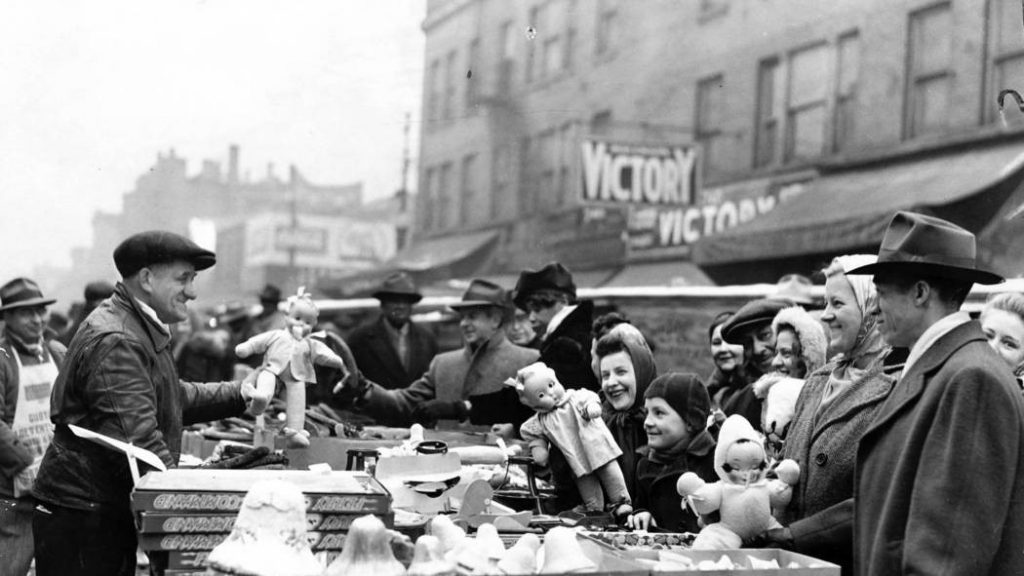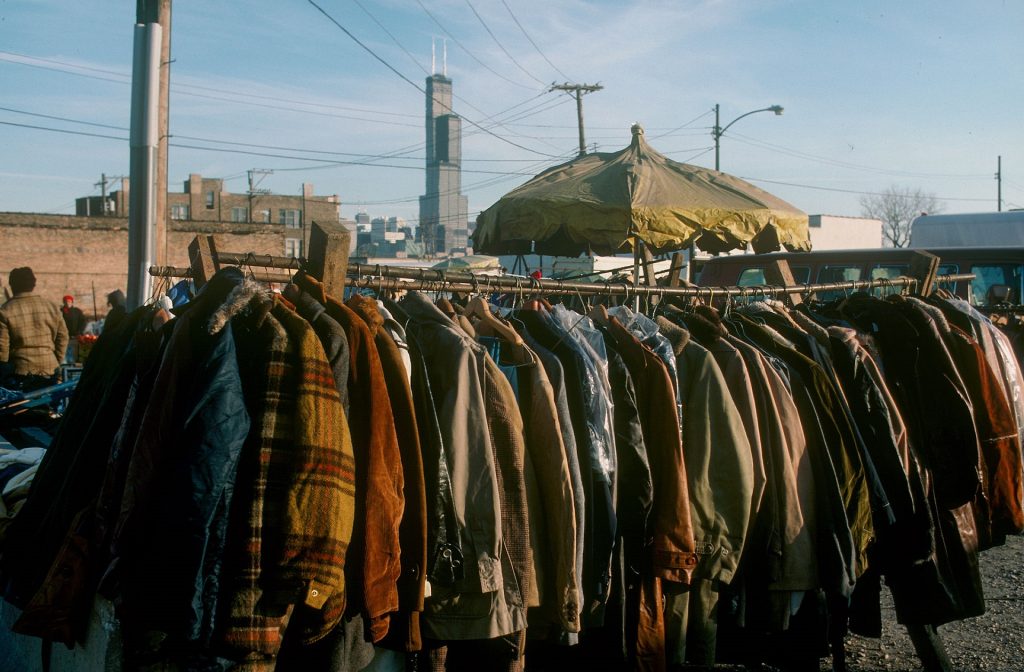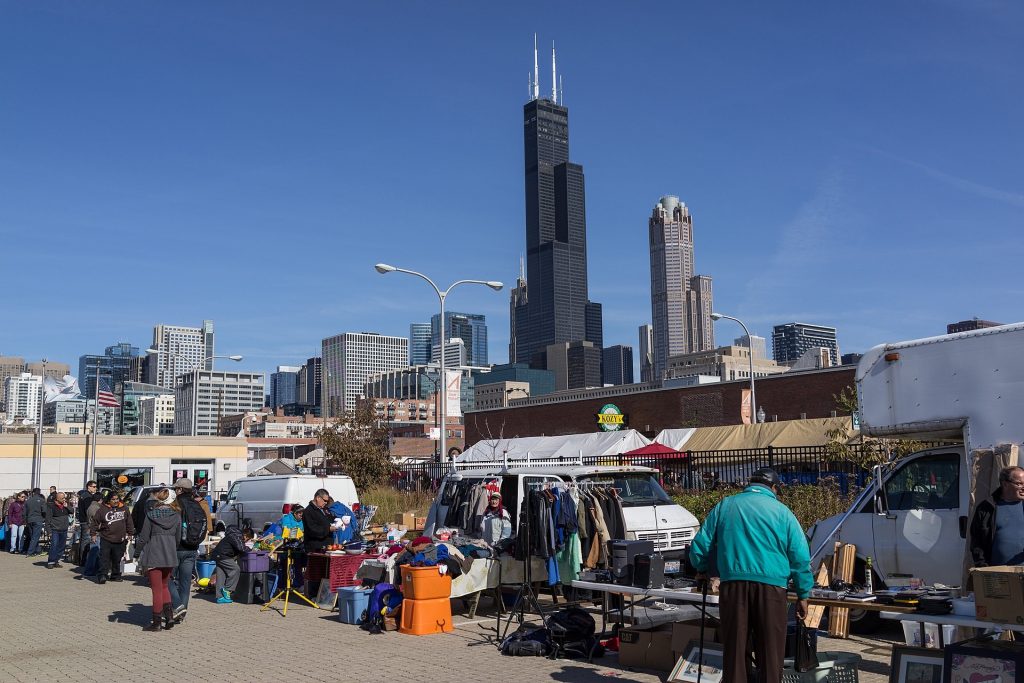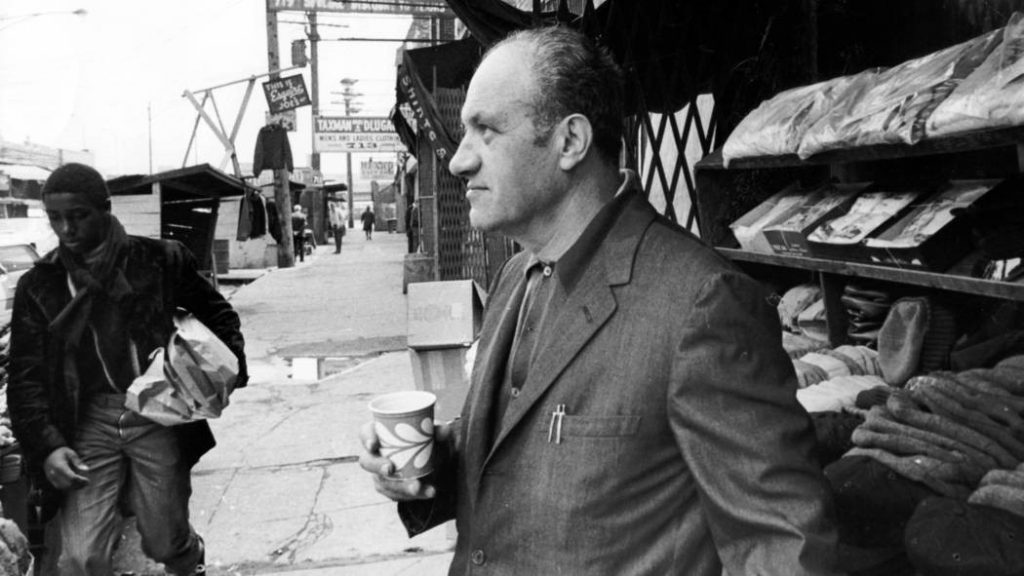 Maxwell Street first appears on a Chicago map in 1847. The street was named for a Chicago physician by the name of Dr. Philip Maxwell. It was originally a wooden plank road that ran east-west from the south branch of the Chicago River. The earliest housing was built by and for Irish immigrants who were brought to Chicago to construct the first railroads. It continued to be a “gateway” neighborhood or immigrants and others, including Greeks, Bohemians, Russians, Germans, Italians, African Americans and Mexicans (courtesy to Wikipedia).
Maxwell Street first appears on a Chicago map in 1847. The street was named for a Chicago physician by the name of Dr. Philip Maxwell. It was originally a wooden plank road that ran east-west from the south branch of the Chicago River. The earliest housing was built by and for Irish immigrants who were brought to Chicago to construct the first railroads. It continued to be a “gateway” neighborhood or immigrants and others, including Greeks, Bohemians, Russians, Germans, Italians, African Americans and Mexicans (courtesy to Wikipedia).
I knew Maxwell Street as the Maxwell Street Market. On Sundays when the Bears weren’t playing or the fish weren’t biting in the Fall and Winter my grandfather or my father and I would go to the Maxwell Street Market. This was an open-air market with everything you could possibly want and the ability to negotiate your price for any of those items. There were Maxwell Street Polish sausage sandwiches and Chicago blues music as well as a variety of Greek, Italian and Bohemian delicacies to choose from. Sometimes a friend and his father would attend. Maxwell Street is where the Blues Brothers went looking for Matt “Guitar” Murphy and “Blue” Lou Marini in the diner owned by Aretha Franklin.
It’s were John Lee Hooker played one of his songs with a great harmonica accompaniment. Don’t ever recall seeing him play live but I do remember getting some great fried chicken, fried shrimp, dumplings, gyros and even borscht soup.
 When the time came, I would need something, say another football, basketball or winter coat, I would ask my father to get them. His response without fail was “We will get it on Maxwell Street this Sunday”.
When the time came, I would need something, say another football, basketball or winter coat, I would ask my father to get them. His response without fail was “We will get it on Maxwell Street this Sunday”.
And so, my footballs, street hockey sticks, basketballs, skateboards and winter coats all came from Maxwell Street. Our “rabbit ear” antennas came from that market. Later, our first Betamax player, VHS player and “universal” remote controls. The trilogy of Odyssey, Bally and Atari video console players all came from Maxwell Street. If my mother needed a new frying pan, blender or salad bowl, chances were we were going to get it from the only store my father seemed to know.
In addition to the great sounds, smells and tastes of the Maxwell Street Market, there was the negotiating that went on over prices and deals. Negotiating is probably too strong a word – haggling would be more like it.
If I wanted a new Walter Payton or Michael Jordan jersey or Dennis Savard or Tony Esposito sweater, there was no way my father was going to pay full retail for a #34, #23, #18 or Esposito’s #35. Despite the prices already being marked down from the full retail price, my father always thought someone might sell it for less than that. And he was usually right. He was a master haggler and salesmen in his own right. His colleagues knew it. On Sundays when he wasn’t on the buying side of the table opposite a street vendor and his van, he was behind the jewelry counter selling gold, silver and diamonds. And certainly, most of his customers weren’t going to pay the markup he was offering either.
 Nonetheless, if a #23 that retailed for $80 in Montgomery Ward or JC Penney or Sears, it might be $15 on Maxwell Street. Perhaps it was missing the official league seal of approval or was not the $80 jersey in terms of quality, but if it fit it was close enough. The $15 jersey would end up costing my father $7.50. If that didn’t work out, he would get an Atari cartridge, frying pan and the jersey for $15.
Nonetheless, if a #23 that retailed for $80 in Montgomery Ward or JC Penney or Sears, it might be $15 on Maxwell Street. Perhaps it was missing the official league seal of approval or was not the $80 jersey in terms of quality, but if it fit it was close enough. The $15 jersey would end up costing my father $7.50. If that didn’t work out, he would get an Atari cartridge, frying pan and the jersey for $15.
My father called it “the bundle”. If the merchant doesn’t have the margin on a single item, he could make it on multiple items. Come Monday, my father would be on the other side of a transaction trying to keep his margin as high as possible on the 200% markup on the jewelry.
Other than one Chicago Blackhawks winter hat when I was 10 I still have, I don’t recall a pair of boots or gloves or baseball cap or winter hat that wasn’t bought out of a van on Maxwell Street for less than retail and less than a sign that may have had a price on it. School supplies? We will get it on Maxwell Street.
When it came time for prom and graduation, my father tried but on those Sundays, tuxedos and cap and gowns were sold out.
My father had a couple of sayings, some of which I can’t publish, but one of which was “If it isn’t on Maxwell Street, you don’t need it.”
Nowadays of course when it comes time for hats and gloves or new headphones or a backpack, it comes from a “distribution center” in the US after arriving from China from someone named “topvacuumparts”. There is no haggling. There is no bundling (except to combine shipping) and there certainly isn’t any Green River pop or chocolate phosphate sodas to wash down the pierogis and onions.
You don’t hear any languages being spoken or any exposure to any other cultures or characters, if not for a few hours on a Sunday afternoon. There is no trading a watch for a television like I use to see.
A recent article on the Maxwell Street Market in the Chicago Tribune reminded me of these experiences (I still read a real newspaper daily). The author is a few years older than I. Apparently, a small market still exists, largely minimized by expansion by the University of Illinois at Chicago and increased regulations on street vendors by the city.
The article and related articles mention:
“There are places that stick with us through the decades even though they may no longer exist in brick and mortar, in sights and sounds and smells, and for a couple of generations of Chicagoans still alive and kicking one of those places is known as Maxwell Street. In the shadow of the Loop’s skyscrapers, there once was an open-air bazaar with sights, sounds and smells that seemed magically transported across time and space from some Old World village.”
 “Hawkers, spielers, pitchmen, and hucksters shout their wares while radios boom and customers haggle in a dozen languages. Merchandise drapes from awnings, spills over sidewalk stands and creaking pushcarts, litters the pavement and walks wherever the hawkers elect to take their stand. There is the sharp odor of garlic, sizzling redhots, spoiling fruit, aging cheese, and the strong suspect smell of pickled fish.” Everything blends like the dazzling excitement of a merry-go-round.”
“Hawkers, spielers, pitchmen, and hucksters shout their wares while radios boom and customers haggle in a dozen languages. Merchandise drapes from awnings, spills over sidewalk stands and creaking pushcarts, litters the pavement and walks wherever the hawkers elect to take their stand. There is the sharp odor of garlic, sizzling redhots, spoiling fruit, aging cheese, and the strong suspect smell of pickled fish.” Everything blends like the dazzling excitement of a merry-go-round.”
That’s how I remember it.
Footnote: Dr. Maxwell was born in Vermont in 1799 and moved to New York when he became a physician. In 1832, he became a physician for the United States Army and was assigned to Fort Dearborn, Chicago until it was abandoned in 1836. He was promoted to full surgeon in 1838 and served with General Zachary Taylor. He decided to make his home in Chicago after resigning from the service where he had a medical practice downtown (courtesy of Wikipedia).
































